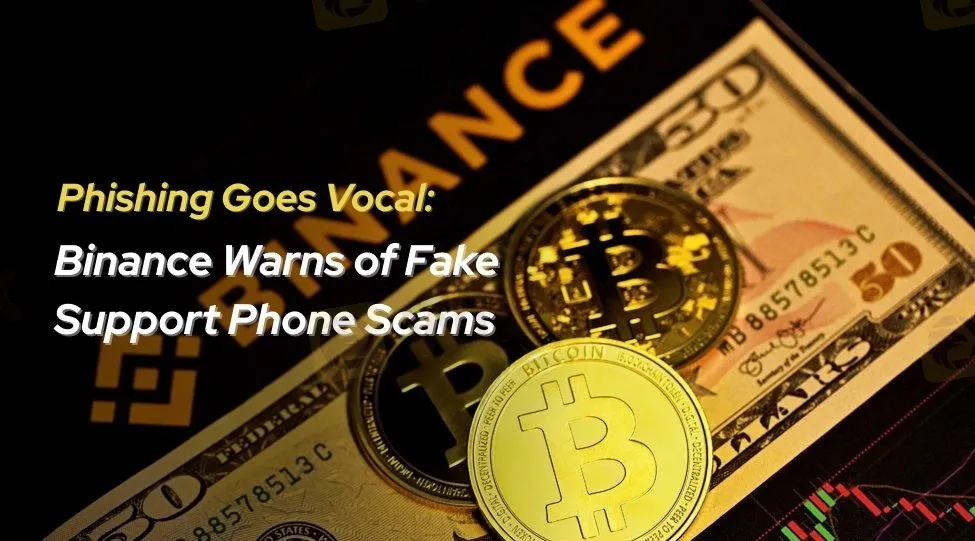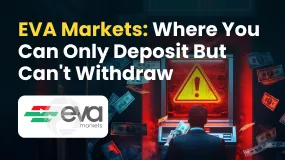简体中文
繁體中文
English
Pусский
日本語
ภาษาไทย
Tiếng Việt
Bahasa Indonesia
Español
हिन्दी
Filippiiniläinen
Français
Deutsch
Português
Türkçe
한국어
العربية
Phishing Goes Vocal: Binance Warns of Fake Support Phone Scams
Abstract:Binance introduces SMS-based security codes as scammers shift tactics from links to phone call traps.

Cryptocurrency exchange Binance has issued a warning regarding a wave of phishing scams that are now taking the form of SMS messages urging recipients to call a fake support number, rather than clicking a suspicious link.
These messages, designed to appear urgent and official, often include prompts such as “Not you?” to create anxiety and pressure the target into making a phone call. The scammers behind these messages then attempt to extract sensitive information by posing as Binance support representatives over the phone.
In response, Binance has extended its Anti-Phishing Code—a user-customized security tag that previously applied to email communication—to SMS notifications. This code helps users verify that a message truly originates from Binance. The feature is now available in all jurisdictions where the platform is officially licensed to operate.
Binances Chief Security Officer, Jimmy Su, confirmed in a statement to BeInCrypto that the company is aware of the increasing number of such scams. “Scammers are using SMS to impersonate Binance and other legitimate senders. These messages often look credible and trick users into revealing credentials or transferring funds,” Su stated.
Binance noted that both users and non-users have reported receiving these messages, suggesting that attackers may be using third-party databases to target phone numbers, regardless of whether the individuals are active Binance customers.
To combat this, Binance recommends verifying the presence of the Anti-Phishing Code in all official messages and encourages users to avoid calling phone numbers embedded in unsolicited texts. Instead, users should confirm all activity directly through the official app or website.
In addition to enabling the Anti-Phishing Code, Binance advises turning on multi-factor authentication and refraining from sharing personal or account-related information by phone. Any suspicious communication should be reported to the platforms support team for investigation.
This latest adaptation of phishing tactics underlines the evolving nature of social engineering in the cryptocurrency space. Rather than relying solely on malicious links, fraudsters are now increasingly turning to direct phone contact—adding a vocal layer to their deception.
Disclaimer:
The views in this article only represent the author's personal views, and do not constitute investment advice on this platform. This platform does not guarantee the accuracy, completeness and timeliness of the information in the article, and will not be liable for any loss caused by the use of or reliance on the information in the article.
Read more

Future of Forex in India: Growth or Global Domination?
Every Trader or Investor in India who wants to invest in the dynamic forex market must read this important article. It explores the future of the forex market in India and answers a common question: Forex market will rise or crash in India ? Checkout the article below.

Investors Accuse Duttfx Markets of Scam: What You Should Know
Duttfx Markets has been tagged as a ‘Scammer’ for its illegal forex trading business. Investors have been complaining about this Comoros-based forex broker on several review platforms. Withdrawal denials, pressure to make more deposits, trading manipulation, and account blocking are some raging issues affecting investors here. Read this exposure story to find out the truth.

EVA Markets: Where You Can Only Deposit But Can't Withdraw
EVA Markets is becoming the nemesis for forex investors with complaints about withdrawal denials, trading manipulation, and pressure for more deposits, making headlines. Here's the exposure story of EVA Markets, where its investors have given it a bad review. Check it out!

San Francisco Financial Advisor Arrested in $9.5M Ponzi Scheme
Federal prosecutors charge Edwin Emmett Lickiss Jr. in a $9.5M Ponzi scheme involving fake investments, wire fraud, and money laundering across California and Idaho.
WikiFX Broker
Latest News
Samsung Electronics signs $16.5 billion chip-supply contract; shares rise
Does XS.com Hold Leading Forex Regulatory Licenses?
European stocks set to rise after the U.S. and EU strike trade agreement
Elon Musk confirms Tesla has signed a $16.5 billion chip contract with Samsung Electronics
Chile Bumps Up Copper Price Forecast and Flags Lagging Collahuasi Output
Top Wall Street analysts recommend these dividend stocks for regular income
Stock futures rise as U.S.-EU trade deal kicks off a hectic week for markets: Live updates
Treasury yields tick lower as investors look ahead to Fed's interest rate decision
Thailand-Cambodia War Pressures Thai Baht in Forex Market
Investors Accuse Duttfx Markets of Scam: What You Should Know
Currency Calculator


